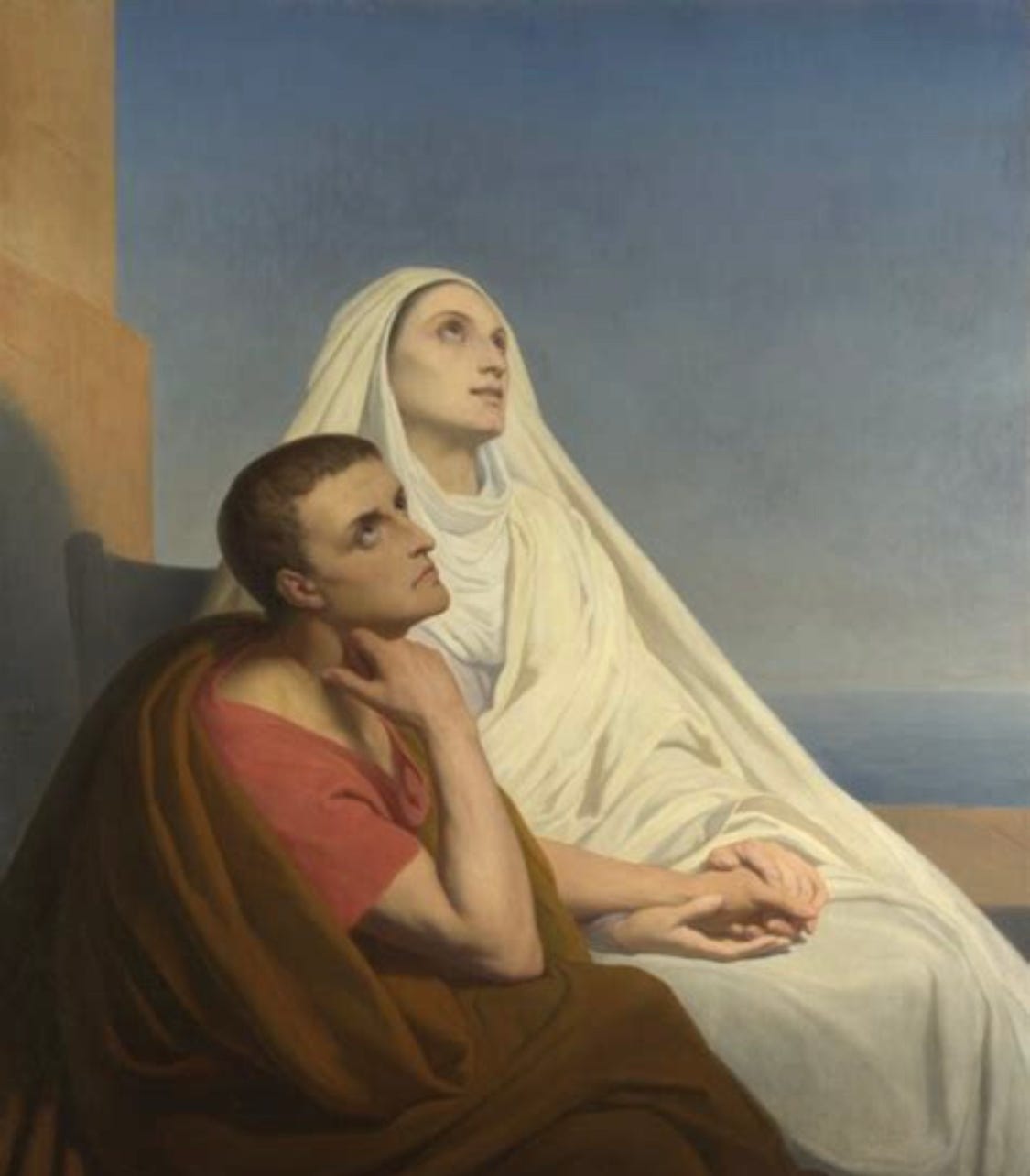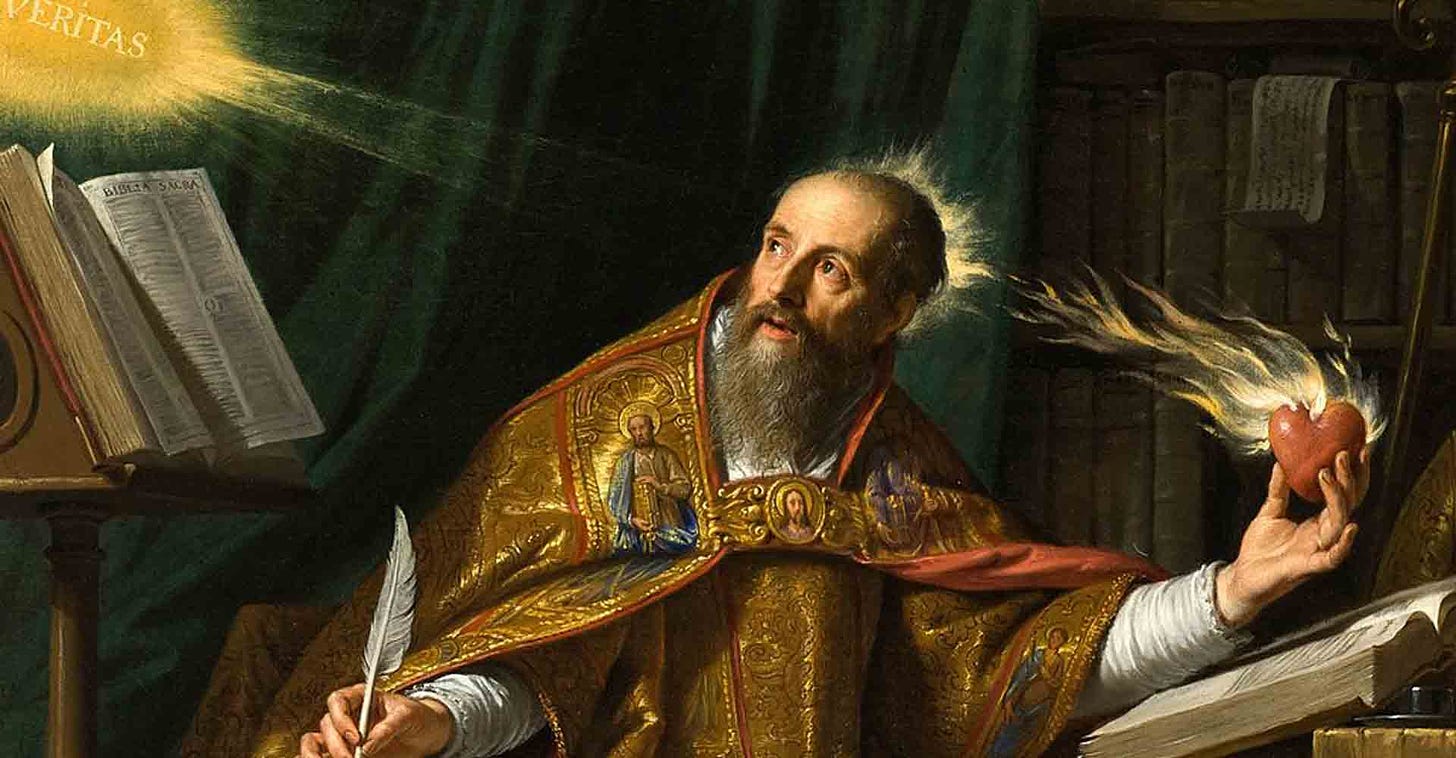“To fall in love with God is the greatest romance; to seek him the greatest adventure; to find him, the greatest human achievement.” —St. Augustine
(Note: This article was originally written and published last year.)
Today is the feast of St. Augustine of Hippo, who is one of the greatest saints and most influential theologians of the Catholic Church. His works, including The City of God, De Doctrina Christiana (On Christian Doctrine), Confessions, and De Trinitate (On the Trinity), continue to inspire and instruct Christians to this day.
Augustine was born in 354 AD in Tagaste, North Africa, to a pagan father and a Christian mother, St. Monica. Well-educated and brilliant, Augustine led a wild and dissolute youth, most particularly enchained to lust; he lived with a mistress for many years and had a son, Adeodatus (meaning gift of God). Augustine famously described his attitude during his youth as being, “God, give me chastity and continence—but not just now.”
Eventually, through the many prayers of his mother Monica and the aid of the bishop St. Ambrose of Milan, Augustine, who had been a heretic for many years, converted to Catholicism. It was a complete change—Augustine the former sinner and heretic dedicated his life to God, the “Beauty ever ancient, ever new.” After Monica’s death Augustine returned to Africa, where he sold his property, gave the money to charity, and founded a monastery. He was a monk and a priest and eventually bishop of Hippo in 396. He fought various heresies and shepherded his people during the fall of the Roman Empire to the Vandals. Besides all of his active work, Augustine was a prolific writer, as mentioned above—and besides his theological works and preaching, Augustine corresponded and worked with other saints of his day, including St. Jerome, St. Simplician of Milan, and St. Alypius of Tagaste. He died in 430 AD.
On the feast day of this mighty warrior for Christ, I wanted to share and reflect on a few of his wise sayings.
“In this world, two things are essential: life and friendship.”
“But we must beware of the man who abounds in eloquent nonsense.”
Sometimes the cleverest people are the least truthful. As Augustine found throughout his life, it is important to analyze what everyone—even people who are “experts”—tell you to see whether it is factual or not.
“He made thee, unknown to thee; but, without thy consent, he does not make thee righteous.”
This speaks to a very key but widely misunderstood truth of the Faith: that God cannot force anyone to be good or happy. What that means is that if a person chooses to do evil things, God cannot take that person to Heaven, because Heaven consists in the presence of God, and a person who wills evil cannot be happy in the presence of pure Goodness (God). That is the key of Jesus’ Parable of the Sheep and Goats (Matt. 25), where entrance to Heaven is based on the person’s free will actions. Happiness both in this life and in the next is our choice.
“Let his manner of living be an eloquent sermon in itself.”
This is another way of saying what St. Francis of Assisi recommended; “Preach the Gospel always and, if necessary, use words.” One of the biggest reasons why people do not convert to Christianity is because of Christians whose actions are at odds with their stated beliefs. Even the brilliant Augustine, whose words have touched so many thousands of people over the centuries, knew that actions speak louder than words—or, as Jesus put it (Matt. 7:20), “By their fruits you shall know them.”
“Conquer yourself and the world lies at your feet.”
No one can hope to change the world for the better, to control his life and his destiny, unless he first has self-control. An internally disordered person cannot impose order in his life. In our sinful world, the most essential type of command is self-command.
“I will suggest a means whereby you can praise God all day long, if you wish. Whatever you do, do it well, and you have praised God.”
“Ought you, as far as you can, to suffer it if, perchance, you see anything wicked?...Stop those whom you can; hold back those whom you can; flatter [that is, cleverly persuade] those whom you can; but don’t keep quiet....But if you (say)...’What concern of mine is it to care about the sins of others?’...Say now, does there not come to your mind that servant who hid the talent and refused to use it [Matt. 25]?”
St. Augustine took very seriously the Biblical admonition (Ez. 3:18-19) that someone who does not try to stop another from sinning is guilty of sin as well. The servant in the Parable of the Talents is condemned to be cast out into darkness because he did not use his talent. This is a truth that is largely lost in modernity and needs to be rediscovered. Every time a family member or friend or co-worker does something bad or vocally supports something wicked and you do not at least challenge him, you are guilty of sin yourself.
“If I call thee the mother of nations, thou art above this praise. If I style thee Lady of angels, thou art truly proved to be so.”
St. Augustine knew from his own life how tremendously important a mother can be in leading one to God, so it is only natural that he should have had a strong devotion to Jesus’s mother, Mary. The words above were penned by Augustine in praise of the Blessed Virgin.
I think I cannot end better than with Augustine’s famous quote from his Confessions, on how nothing can fully satisfy the human heart but God:
“Quia fecisiti nos ad te et inquietem est cor nostrum donec requiescat in te (Because You made us for Yourself and our heart is restless until it rests in Thee).”





